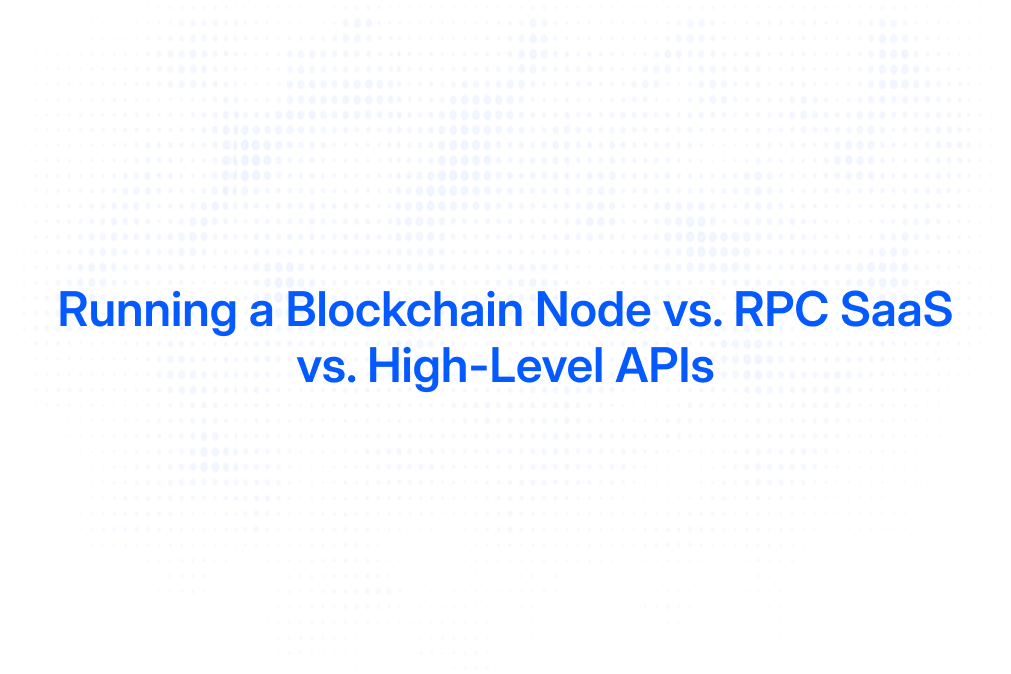Uniblock vs Ankr: Reliability & Cost Compared
In the rapidly evolving world of Web3 development, choosing the right Remote Procedure Call (RPC) provider is crucial for building reliable, scalable, and cost-effective blockchain applications. Among the many options available, Uniblock and Ankr stand out as prominent RPC solutions, each with its unique strengths. This article delves into a detailed comparison of Uniblock and Ankr, focusing on two critical factors for developers and businesses alike: reliability and cost.
Understanding RPC Providers and Their Importance
Before diving into the comparison, it's essential to understand what RPC providers do and why they matter. RPC providers act as intermediaries that allow blockchain applications to communicate with blockchain nodes. They handle API requests, enabling developers to read blockchain data, send transactions, and interact with smart contracts efficiently. This functionality is crucial because, without reliable RPC services, developers would face significant hurdles in building responsive applications that can leverage the full potential of blockchain technology. The complexity of managing direct connections to multiple nodes can be overwhelming, especially as the number of users and transactions grows.
Reliability in RPC services means minimizing downtime and latency, ensuring that blockchain apps remain responsive and functional. Cost, on the other hand, directly impacts project budgets, especially for startups and scaling applications that require millions of API calls. Balancing these two aspects is key to a successful Web3 infrastructure. Furthermore, the choice of RPC provider can influence the overall user experience; a slow or unreliable service can lead to frustrated users and lost opportunities. Developers must also consider the geographical distribution of nodes, as this can affect latency and performance depending on where the end-users are located. Additionally, some RPC providers offer advanced features, such as rate limiting and enhanced security protocols, which can further differentiate their services in a competitive market.
Reliability: How Do Uniblock and Ankr Compare?
Uniblock’s Multi-Provider Auto-Routing for Enhanced Uptime
Uniblock distinguishes itself with its advanced RPC auto-routing technology. By leveraging multiple RPC providers simultaneously, Uniblock reduces the risk of single points of failure. This multi-provider approach ensures that if one RPC endpoint experiences downtime or latency spikes, traffic is automatically routed to healthier nodes, maintaining seamless application performance.
This strategy aligns with the emerging best practices in Web3 infrastructure, where multi-provider RPC routing is becoming the standard to improve reliability and redundancy. According to recent insights, using multiple RPC providers can significantly reduce RPC downtime, which is critical for applications where every second of outage translates to lost user engagement and potential revenue.
Ankr’s Distributed Node Network and Reliability Guarantees
Ankr operates a distributed network of nodes across various blockchains, offering decentralized access to RPC endpoints. This decentralized infrastructure inherently enhances reliability by avoiding centralized bottlenecks. Ankr also provides Service Level Agreements (SLAs) that promise high uptime, which is reassuring for enterprise-grade applications.
However, unlike Uniblock’s auto-routing mechanism, Ankr typically relies on single-provider endpoints per request, which can introduce risks if a particular node faces issues. While Ankr’s network is robust, the lack of built-in multi-provider failover means developers may need to implement additional logic to handle failover scenarios.
Latency and Multi-Region Support
Latency plays a pivotal role in user experience, especially for decentralized applications (dApps) that require real-time interactions. Uniblock’s multi-region RPC routing reduces latency by directing requests to the nearest or fastest available node, optimizing response times globally.
Ankr also supports a wide geographic distribution of nodes, but without an automatic multi-region routing layer, latency optimization depends more on the developer’s manual configuration. This can lead to suboptimal performance in some cases, particularly for globally distributed user bases.
Cost Comparison: Which Provider Offers Better Value?
Uniblock’s Cost Optimization Through Auto-Routing
One of Uniblock’s standout features is its ability to reduce RPC costs by intelligently auto-routing traffic to the most cost-effective providers without compromising reliability. This dynamic routing allows startups and large projects alike to optimize expenses, sometimes reducing RPC costs by up to 40% compared to traditional single-provider setups.
By aggregating multiple RPC providers, Uniblock enables users to leverage competitive pricing models, avoiding vendor lock-in and expensive overages. This flexibility is particularly beneficial for projects scaling to millions of API calls, where cost efficiency can significantly impact the bottom line.
Ankr’s Pricing Model and Value Proposition
Ankr offers a straightforward pricing model with tiered plans based on usage, which can be attractive for developers seeking predictable costs. Its decentralized node infrastructure also means that some RPC endpoints are community-powered, potentially lowering costs.
However, because Ankr does not natively support multi-provider auto-routing, users may face higher costs if they need to subscribe to multiple plans or implement additional infrastructure to ensure redundancy and failover. This can increase operational complexity and expenses over time.
Hidden Costs and Economic Considerations
Both providers must be evaluated not only on sticker price but also on hidden costs such as downtime, latency penalties, and the engineering effort required to maintain uptime and performance. Uniblock’s integrated multi-provider routing reduces the risk of costly outages and developer overhead, translating into long-term savings.
Ankr’s decentralized model offers resilience but may require more manual intervention to achieve the same level of reliability, potentially increasing maintenance costs. Understanding these nuances is essential for projects with tight budgets and high reliability demands.
Additional Factors to Consider
Scalability and API Orchestration
Uniblock’s platform is designed with scalability in mind, offering API orchestration capabilities that simplify integrating multiple RPC providers into a single endpoint. This streamlines development and reduces complexity, making it easier to scale blockchain applications without breaking the budget.
Ankr supports a broad range of blockchains and APIs but may require more manual setup for multi-provider orchestration. Developers looking for a turnkey solution might find Uniblock’s approach more convenient.
Support for Emerging Technologies and Blockchains
Both Uniblock and Ankr continuously expand their support for new blockchains and protocols. Uniblock’s multi-provider model allows seamless integration of emerging RPC providers, ensuring developers have access to the latest infrastructure innovations.
Ankr’s extensive node network also supports many blockchains, but the flexibility to switch or combine providers dynamically is less pronounced compared to Uniblock.
Conclusion: Choosing Between Uniblock and Ankr
When evaluating Uniblock versus Ankr, the decision largely hinges on the specific needs of the project regarding reliability, cost, and operational complexity.
- Choose Uniblock if: You prioritize maximum uptime, want to leverage multi-provider auto-routing to reduce downtime and latency, and seek cost optimization through dynamic routing. Uniblock’s approach minimizes risks associated with single-provider dependence and simplifies scaling.
- Choose Ankr if: You prefer a decentralized node network with straightforward pricing and are comfortable managing failover and redundancy manually. Ankr is a solid choice for projects valuing decentralization and predictable costs but may require more hands-on management for optimal reliability.
Ultimately, the future of Web3 infrastructure is moving towards multi-provider, multi-cloud solutions that combine reliability, scalability, and cost efficiency. Uniblock’s innovative auto-routing technology positions it well in this landscape, while Ankr’s decentralized approach offers a strong alternative depending on project priorities.
For developers and businesses building on blockchain, understanding these nuances ensures informed decisions that enhance application performance and sustainability in the competitive Web3 ecosystem.
Ready to elevate your blockchain development with unparalleled reliability and cost efficiency? Join over 2,000 developers on Uniblock, the Web3 infrastructure orchestration platform that's revolutionizing how applications connect to blockchain data. With Uniblock, you'll enjoy maximized uptime, minimal latency, and significant savings on infrastructure costs—all through a single API endpoint. Say goodbye to vendor lock-in and scale your project with confidence across 100+ chains. Start building with Uniblock today and experience the seamless integration of multi-provider RPC, API, and webhook traffic that sets your dApps, tooling, or analytics apart in the competitive Web3 ecosystem.
.svg)


.png)



